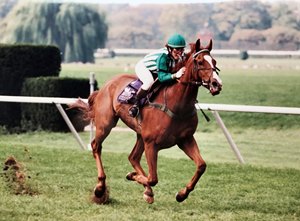Look Back: Lonesome Glory Earns a Fifth Eclipse Award


In conjunction with Tom Hall's Throwback Thursday feature in BloodHorse Daily, which this week looks at five-time steeplechase Eclipse Award winner Lonesome Glory; BloodHorse.com each Thursday will present corresponding stories from the pages of the magazine. This week is the Eclipse Award story that ran following Lonesome Glory's fifth Eclipse Award. The story was written by Joe Clancy Jr and appeared in the Jan. 22, 2000 issue. The Lonesome Glory Handicap (NSA-1) is scheduled for Sept. 21 at Belmont Park.
Despite racing just twice in 1999, Lonesome Glory won the Eclipse Award because of two things: 1) Performance. He won both starts, the $98,000 Bank of America Carolina Cup (NSA-1) in March and the $188,000 Royal Chase (NSA-1) in April. His $172,800 in earnings were second only to Ninepins, and led the list until the year's final major race; and 2) Reputation. Already a four-time Eclipse Award winner, Lonesome Glory retired at age 11 in November with an all-time U.S. record of $1,318,868 in career steeplechase earnings.
Owned by in the Jan. 22, 2000 issue. and trained by Bruce Miller, Lonesome Glory is American steeplechasing to many people.
Active since his 3-year-old season in 1991, the son of Transworld won 19 races over fences (two in England, and 17 on American courses) to overshadow nearly every other American jumper for nine seasons.
"He's one of a kind, that's for sure," Miller said after the Keeneland win. "You try to look for what he has in other horses—but most of the time it's just not there."
In 1999, the future Hall of Famer added fabled Keeneland to his list of conquests. Hosting its second annual steeplechase visit, the Lexington track carded the year's richest race on April 23 and attracted the year's best field. Four (NSA) grade I winners lined up for the 21/2-mile race.
From a powerful win in the Carolina Cup a month earlier, Lonesome Glory caught Romantic and Master McGrath in the stretch and held off a late run from Dalton River to win by two lengths. Racing near the lead throughout and flashing his ageless jumping style, Lonesome Glory overwhelmed his rivals and left the track as the championship favorite. The nearly 15,000 on hand for closing day of the track's spring meet roared their approval—and joined the fan club.
"He loves Kentucky," regular jockey Blythe Miller said after the win. "The crowd is so into it here, it's different than in some places we go and I think he notices things like that."
Before Keeneland, Lonesome Glory clobbered Carolina with an easy score against lesser competition in the March 27 Carolina Cup. Fittingly, an all-time American steeplechase record crowd of 69,500 attended the race.
Like the Keeneland fans, the Carolinians saw history. The two races were Lonesome Glory's final starts.
Shelved for a planned vacation through the late spring and summer, Lonesome Glory aimed for a fall return and a championship showdown in the Colonial Cup (NSA-I), but injured a tendon four days before the Nov. 21 Colonial Cup. Officially a slight tear in his left front leg, the injury would not have ended the career of a younger horse but pushed this champion on to a life of fields and foxhunting.
The new career brings Lonesome Glory, named after an area hunted by the Jeffords' family's Andrew Bridge Hounds in Pennsylvania, in full circle. One of nine horses inherited by Jeffords when her husband Walter M. Jeffords Jr. died in 1990, Lonesome Glory never raced on the flat and was sent to Miller as a 2-year-old after proving too headstrong to be a show horse.
His fifth Eclipse Award sets a steeplechase record, and moves Lonesome Glory into the company of horses who have won five times or more: Forego, John Henry, Affirmed, and Secretariat. At age 11, Lonesome Glory is the oldest steeplechase champion.
